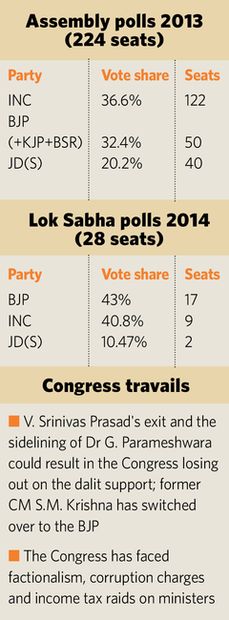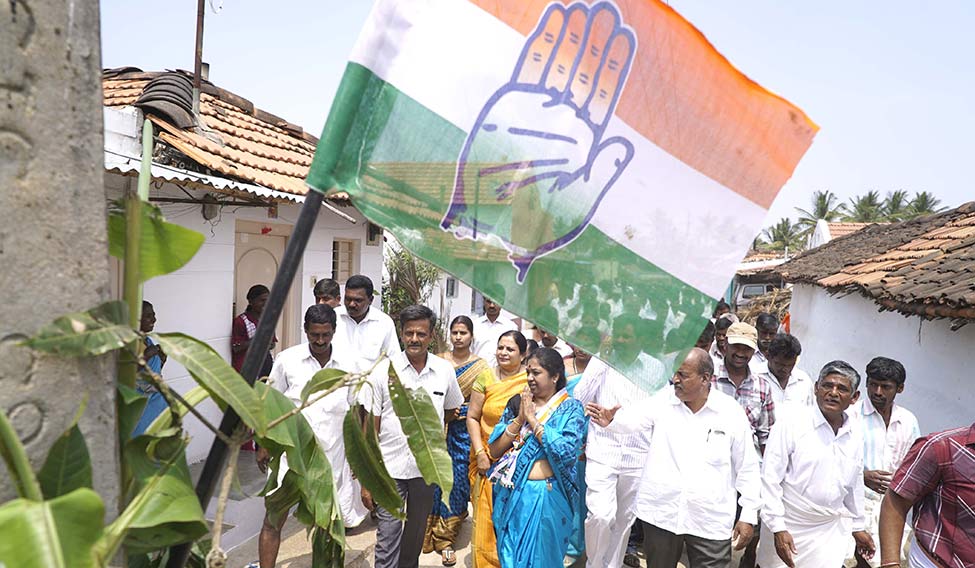The outcome of the recent assembly polls in five states has evoked great interest in Karnataka, where assembly elections are due next year. It is the largest state under Congress rule, the only south Indian state the BJP had captured, and a bastion of a regional party, the Janata Dal (Secular), that relies on the dominant Vokkaliga caste.
The rout of two regional giants, the Samajwadi Party and the Bahujan Samaj Party, in Uttar Pradesh has not shaken the confidence of the longest surviving regional party in Karnataka. The last time the JD(S) came to power was in 2006, and its government lasted barely 20 months. Still, the party is upbeat about its prospects.
The BJP’s recent election victories in battleground states like Assam and UP have raised its hopes of returning to power in Karnataka, where it had formed a government on its own in 2008. The party views the state as its gateway to south India.
The Congress, led by Chief Minister Siddaramaiah, is under tremendous pressure to retain the state and thereby provide a fillip to the party’s prospects in the 2019 Lok Sabha elections. But, for that, it needs to overcome the anti-incumbency factor and the campaigning prowess of Prime Minister Narendra Modi and BJP president Amit Shah.

Will the two “secular” parties—the Congress and the JD(S)—bury the hatchet and strike a pre-poll alliance to prevent the BJP from coming to power? Can the BJP, which lost the 2013 assembly polls because of allegations of corruption, make a comeback with its ambitious ‘Mission 150’ (winning 150 seats)?
Two bypolls in Gundlupet and Nanjangud on April 9 will give some indications. The Gundlupet assembly seat fell vacant after the death of H.S. Mahadeva Prasad, cooperation minister and prominent Lingayat leader. The Congress has fielded Prasad’s wife, Geeta, against Niranjan Kumar of the BJP. As Lingayat votes would play a decisive role in the outcome, the real battle is between Siddaramaiah and B.S. Yeddyurappa, state BJP president who is a Lingayat strongman.
In Nanjangud, V. Srinivas Prasad, the dalit leader who quit the Congress and joined the BJP after he was removed from the cabinet, will take on Congress candidate Kalale Keshavamurthy. The bypoll will be a measure of the dalit discontent with the Congress, which has traditionally held on to the Ahinda (Kannada acronym for minorities, backward classes and dalits) vote bank. This time round, though, the party fears losing the dalit support because of Prasad’s exit and for having kept state party president and dalit leader G. Parameshwara out of the cabinet for almost two years before he was made home minister in 2015.
A look at the vote share of the three parties (see graphics) in the 2013 assembly polls shows that the Congress cannot defeat the BJP unless it joins hands with the JD(S). Their combined vote share could crush the BJP, which got 33 per cent of votes, including that of its breakaway factions Karnataka Janata Paksha and BSR Congress.
In the 2014 Lok Sabha polls, the Modi wave helped the BJP win 17 of 28 seats and a vote share of 43 per cent. The Congress bagged only nine seats, but its vote share was just 2.2 per cent less than the BJP’s. The JD(S), which had won 40 assembly seats in 2013 with a vote share of 20.2 per cent, could win only two seats and a vote share of 10.47 per cent the following year.
The exit of influential leaders like Srinivas Prasad and former chief minister and Vokkaliga leader S.M. Krishna, who has also switched over to the BJP, has dealt a big blow to the Congress, which is already beset with various corruption charges, raids carried out by the income tax department on the residences of ministers and top officials, and the faction feuds between “original” Congressmen and “outsiders” (those who came from the Janata parivar).
So it makes sense for the party to enter into a pre-poll alliance with the JD(S), which is strong only in the Vokkaliga-dominated Old Mysore area and is striving for a pan-Karnataka presence. Having stayed out of power for almost a decade, the JD(S) is struggling to deal with dissidence and dearth of leaders. An alliance might help both the parties consolidate Muslim and Vokkaliga votes.
But, for now, the Congress and the JD(S) insist that they plan to go it alone in the assembly polls. “Our party has no money,” said JD(S) national president H.D. Deve Gowda. “But there is no question of an alliance. We will contest all 224 seats. Even if my party does not get majority, I am prepared to sit in the opposition.”
According to Gowda, the UP result is not a referendum on the future of regional parties. “We understand who broke the unity in [Samajwadi Party leader] Mulayam Singh’s house,” said the former prime minister. “If the Modi wave is a reality, why didn’t it work in Punjab, Goa or Manipur? The people of Karnataka remember what each party has done for them. I am confident that people will vote for us based on Kumaraswamy’s performance as chief minister.”
H.D. Kumaraswamy, Gowda’s son and state JD(S) president, said the Modi wave would not work in Karnataka. “He cannot single out the corruption in the ruling Congress, when the BJP government [headed by Yeddyurappa] is known to have faced a slew of corruption charges,” he said. “It takes a JD(S) to rein in the BJP in Karnataka. In UP, no one but the SP is to blame for its debacle, as it did no introspection after it lost seats to the BJP in the 2014 polls.”
Siddaramaiah, too, said the UP result was no indication of a Modi wave. “It was a vote against the Akhilesh Yadav government,” he said. “The BJP won because of polarisation and not because of a Modi wave. In Karnataka, we have provided good governance and delivered 125 of 165 poll promises.”
The bypolls are a matter of prestige for both the Congress and the BJP. Leading their campaigns are Siddaramaiah and Yeddyurappa. The Congress has deployed as many as 14 ministers to secure victory in the two constituencies. The fact that the JD(S) has not fielded candidates in the bypolls is an indication that it could opt for an alliance with the Congress in the assembly polls.







